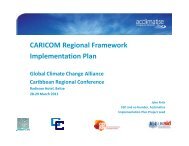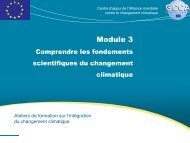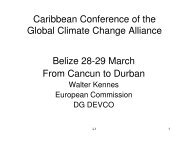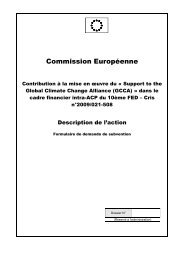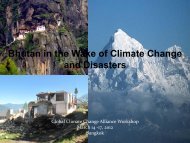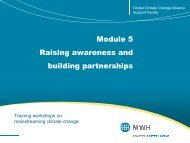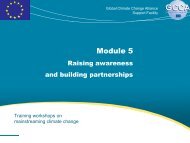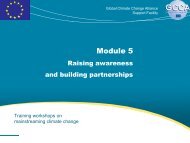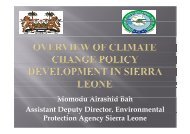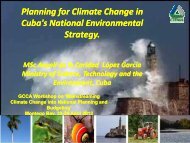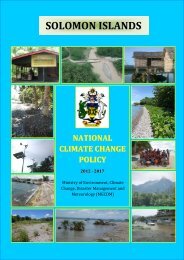Chapter 5 The most critical data sets that are required at present are those needed to generate climate modelsand projections to facilitate adaptation planning. Key variables are temperature, rainfall and rainfall intensity.RMS is currently implementing a five-year Strategic Plan, which includes upgrading the network ofmeteorological stations. It will be complemented by the Mt Karisimbi climate observatory project. Thisnetwork will provide climate information necessary for future monitoring, climate trend detection,vulnerability mapping, management of climate variability, early warning and disaster management, anddevelopment of a weather index-based crop insurance industry. The information will complement historicaldata, and update historical records and re-analyses. In addition, MIDIMAR is developing a database ofdisasters, including from extreme weather events which will complement the work done by RMS.The priorities for the Integrated Planning and Data Management Pillar are:Priority 1. Identify, record and maintain fundamental integrated data sets according tointernational standards, particularly for energy and waterPriority 2. Develop climate compatible national and district level sector plans integrated withnational strategies based on the National Land Use and Development Master PlanPriority 3. Develop a robust forecast of future resource demands and vulnerabilities which arestress tested for future shocks, with applicable warning indicatorsPriority 4. Develop monitoring, reporting and evaluation systems to improve planning andprovide the evidence base to receive climate financePriority 5. Improve spatial data by harnessing ICT and GIS (Geographic Information System)technologyKey responsible stakeholders are: RNRA Land and Mapping Department, RMS, MIDIMAR,MINALOC, Disaster Management Task Force, MOHPillar 5: Technology, Innovation and InfrastructureThe application of, and investment in technology, innovation and infrastructure is vital fordevelopment. <strong>Rwanda</strong> has the opportunity to leapfrog old technologies and destructive developmentpathways, and build a green economy, resilient to oil prices spikes and a changing climate. The developedworld faces a huge challenge as it is locked into high carbon infrastructure, systems and lifestyles. It is verycostly to retrofit or replace capital intensive technology and even more difficult to induce behaviour changein citizens across the globe. Infrastructure is expensive, has long lead times to implementation and long lifespans and therefore needs to be resilient to future changes in the climate while maximising return oninvestment. Developing countries have the opportunity to choose to follow a low carbon pathway and onethat is climate resilient.This will be supported by technology transfer, a ‘broad set of processes covering the flow of knowhow,experience and equipment for mitigating and adapting to climate change amongst differentstakeholders’ [15] . Examples of technology transfer are power generation technology, energy and waterefficient technology, early warning systems and soil management. Technology and knowledge can betransferred from developed or developing countries to <strong>Rwanda</strong> and through the private sector ordevelopment partners such as the United Nations Industrial Development Organisation (UNIDO). In 2008the World Business Council for Sustainable Development (WBCSD) set up the Eco-Patent Commons toprovide free access to patents for environmentally beneficial knowledge and technology. This provides asignificant opportunity for the private sector in <strong>Rwanda</strong>.36Government of <strong>Rwanda</strong>
Chapter 5A Technology Needs Assessment (TNA) for <strong>Rwanda</strong> is underway with UNEP and <strong>Rwanda</strong> can applyfor technology transfer through the Technology Mechanism agreed at COP16 aimed at boosting globalclean technology cooperation. Funding for research and development of new technology, particularly in theareas of agriculture and energy, will be sought and capacity will be developed at universities in <strong>Rwanda</strong>over the long term. Other channels for technology transfer will be investigated, particularly bilateralarrangements and south-south transfer and collaboration in technology R&D.Chapter 5: Enabling Pillars<strong>Rwanda</strong>’s Private Sector Federation (PSF) is working to mainstream water and energy efficiency andwaste recycling through the <strong>Rwanda</strong> Resource Efficient and Cleaner Production Centre (RRECPC) set up in2008. It works closely with industry and has already demonstrated the financial benefits of saving energyand water. A <strong>Climate</strong> Innovation Centre (CIC) has been proposed for <strong>Rwanda</strong> to facilitate private sectordevelopment and to support small to medium enterprises (SMEs) in providing goods and services forclimate resilient low carbon development. CICs are aimed at helping developing countries accelerate thedeployment of climate technologies, companies and industries by identifying and analysing supportnetworks, centres of excellence, gaps in institutional capacity and the financial landscape. Both initiativeswill be supported and expanded.The priorities for the Technology, Innovation and Infrastructure Pillar are:Priority 1. Identify and implement applicable technologies through technology transfer to driveefficiency of resource consumption and creation, particularly in energy and waterPriority 2. Perform local research and development of applicable technologies for climateresilience and low carbon development, particularly for agriculturePriority 3. Invest in relevant climate resilient infrastructural projects, particularly an all-weatherroad network and irrigationPriority 4. Develop links to regional and international centres of excellence to benefit from thelatest research on climate resilience and low carbon developmentKey responsible stakeholders are: MINICOM, MINIRENA, MININFRA, EWSA, RNRA, KIST, PSF,Institute for Scientific and Technological Research (IRST), <strong>Rwanda</strong> Agricultural Research Institute(ISAR), Industrial Research and Development Agency (IRDA)National <strong>Strategy</strong> on <strong>Climate</strong> <strong>Change</strong> and Low Carbon Development 37



